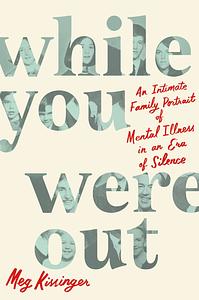Take a photo of a barcode or cover
862 reviews for:
While You Were Out: An Intimate Family Portrait of Mental Illness in an Era of Silence
Meg Kissinger
862 reviews for:
While You Were Out: An Intimate Family Portrait of Mental Illness in an Era of Silence
Meg Kissinger
informative
inspiring
reflective
medium-paced
challenging
emotional
reflective
medium-paced
challenging
dark
emotional
medium-paced
A powerful and emotional memoir that doesn’t shy away from the dark realities of mental illness, but balances them with hope, insight, and compassion. Kissinger offers a deeply personal look at a time in American history when mental health was cloaked in silence and shame. One of the most moving aspects was watching her father’s perspective evolve—from hiding his daughter’s suicide to openly discussing his son’s decades later. His journey reflects not only societal and religious shifts, but personal growth as well. A challenging but ultimately inspiring read.
This book was hard to read–and hard to set down. Author Meg Kissinger’s family suffered with mental illness that affected generations. Depression, bipolar illness, and alcoholism that resulted in arrests, substance abuse, hospitalizations, institutionalization, and suicide. No one was spared, for even those not born with mental health issues were impacted by family trauma that resulted in guilt, shame, anxiety, and denial.
Kissinger’s father was a charming and successful traveling businessman unable to control his spending; he was bipolar and an alcoholic. Her mother was a brilliant woman who, as a Roman Catholic, couldn’t choose how many children to bear, even when everyone knew it was wearing her down. Depressed, she took drugs and used alcohol, and was often hospitalized without explanation to the children.
The parents were well-off and the children had a live-in nanny, went to fancy summer camps, could buy what they wanted. But the father’s manic runaway spending and self-medication with alcohol impacted their financial security.
With dry humor, Kissinger relates the children’s near-death experiences. The children’s disease manifested around puberty.
First, Nancy acted out with rebellious anger and risky behavior. She became suicidal. After her death, the family hid the truth. Brother Jack became depressive. Danny showed bipolar symptoms and eventually committed suicide.
Kissinger is almost my age. It is horrifying to realize how parents, teachers, religious leaders, and doctors had no paradigm for understanding what was happening to her family members.
Seeking a home for her depressed brother Jack, Kissinger’s investigation revealed a lack of adequate, safe places to live.
Kissinger married and forged a career in journalism, her work named as a finalist for the Pulitzer Prize in reporting. She investigated mental illness for a series of articles. She was convinced to write about her family, a harrowing decision but also healing.
Her research for this book resulted in new insights into her family as she interviewed family and delved into the records.
Kissinger shares her heartbreaking family history with candor. Her work has helped others struggling with mental illness in the family. And will enlighten many of us with the raw truth of how the mentally ill fall have been treated by society.
Thanks to the publisher for a free book.
Kissinger’s father was a charming and successful traveling businessman unable to control his spending; he was bipolar and an alcoholic. Her mother was a brilliant woman who, as a Roman Catholic, couldn’t choose how many children to bear, even when everyone knew it was wearing her down. Depressed, she took drugs and used alcohol, and was often hospitalized without explanation to the children.
The parents were well-off and the children had a live-in nanny, went to fancy summer camps, could buy what they wanted. But the father’s manic runaway spending and self-medication with alcohol impacted their financial security.
With dry humor, Kissinger relates the children’s near-death experiences. The children’s disease manifested around puberty.
First, Nancy acted out with rebellious anger and risky behavior. She became suicidal. After her death, the family hid the truth. Brother Jack became depressive. Danny showed bipolar symptoms and eventually committed suicide.
Kissinger is almost my age. It is horrifying to realize how parents, teachers, religious leaders, and doctors had no paradigm for understanding what was happening to her family members.
Seeking a home for her depressed brother Jack, Kissinger’s investigation revealed a lack of adequate, safe places to live.
Kissinger married and forged a career in journalism, her work named as a finalist for the Pulitzer Prize in reporting. She investigated mental illness for a series of articles. She was convinced to write about her family, a harrowing decision but also healing.
Her research for this book resulted in new insights into her family as she interviewed family and delved into the records.
Kissinger shares her heartbreaking family history with candor. Her work has helped others struggling with mental illness in the family. And will enlighten many of us with the raw truth of how the mentally ill fall have been treated by society.
Thanks to the publisher for a free book.
challenging
dark
emotional
funny
hopeful
informative
inspiring
reflective
sad
medium-paced
Graphic: Child death, Death, Mental illness, Self harm, Suicidal thoughts, Suicide, Suicide attempt
Moderate: Alcoholism, Cursing, Drug abuse, Drug use, Panic attacks/disorders, Terminal illness, Grief, Abortion
emotional
reflective
medium-paced
dark
emotional
hopeful
informative
reflective
sad
medium-paced
emotional
informative
sad
medium-paced



